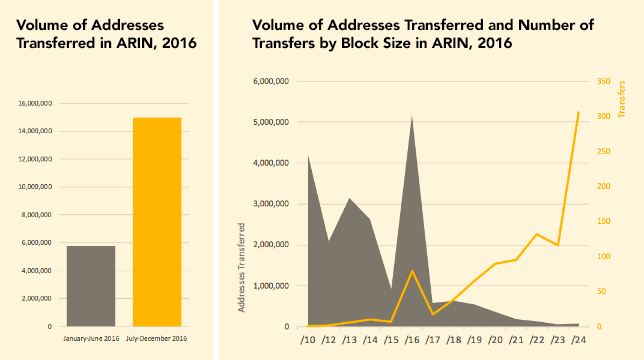

|
||
|
||
In September 2015, the free pool of IPv4 numbers available through the American Registry for Internet Numbers (ARIN) ran dry. In 2016, the IPv4 market was the only reliable source of IPv4 numbers, globally, and the pattern of activity changed dramatically. So far in 2017, we have seen the trends in the last half of 2016 continue.
Throughout 2015, IPv4 transactions were trending steadily upward and the volume of transferred numbers had reached an all time high as several /8 holders sold off their excess supply of IPv4 numbers to large buyers with available liquidity to purchase large amounts of address space. In 2016, the monthly rate of transactions climbed sharply to nearly double the average monthly number of transactions in Q4 2015. The volume of transferred numbers took a different turn. Nearly 40 million IPv4 numbers were transferred via the ARIN transfer approval process in 2015. In 2016, that number dropped by nearly 50%, to just over 20.75 million.
 North American IPv4 Market Activity in 2016 – In the latter half of 2016, the volume of numbers transferred grew from just shy of 5.8 million numbers in the first half of 2016 to nearly 15 million numbers in the last 6 months of 2016 (left chart). Expanding the view to all purchases in 2016, a full 50% of all numbers were transferred as /16 blocks. The chart on the right shows that /16 block trades produced more transferred numbers in 2016 than any other block size. (Click to Enlarge)
North American IPv4 Market Activity in 2016 – In the latter half of 2016, the volume of numbers transferred grew from just shy of 5.8 million numbers in the first half of 2016 to nearly 15 million numbers in the last 6 months of 2016 (left chart). Expanding the view to all purchases in 2016, a full 50% of all numbers were transferred as /16 blocks. The chart on the right shows that /16 block trades produced more transferred numbers in 2016 than any other block size. (Click to Enlarge)
There are several key explanations for the market shift. One, the depletion of large block supply. Whereas 14 /12+ (1,048,576 numbers) blocks transferred via the ARIN transfer approval process in 2015, only 3 such blocks were transferred in 2016. Also, the decision by some large block holders either to sell their blocks in smaller sizes to realize higher unit prices or hold off entering the market altogether until large block pricing improved.
Market indicators show that the higher trading volumes in 2016 are holding steady in 2017, both in the ARIN domestic market and in the InterRIR market where transfers more than doubled in part due to RIPE NCC’s inter-RIR transfer policy which was now in full swing. With hints that AFRINIC and LACNIC may open their doors to InterRIR transfers, we expect this number to grow.
We also expect more supply to enter the market—but not necessarily in the volumes we experienced in 2015. In the first half of 2016, just 5.8 million numbers were transferred. That number more than doubled to nearly 15 million numbers in the last half of the year as prices have risen, sellers have been able to take advantage of more flexible contract structures that allow them to fund renumbering projects, and large buyers are more willing to accept numbers over a more flexible and extended schedule and in smaller block sizes. In 2016, the /16 (65,536 numbers) was a dominant block size in the market, accounting for 50% of all numbers transferred.
As in 2015, pricing trends have continued to mirror the shift in supply and demand. Pricing was at its lowest in Q1 2015, when there was a glut of supply in the marketplace. With tightening of supply in 2016, prices escalated. The average price of small to mid-size blocks grew by just over 30%. Large block pricing nearly doubled, substantially narrowing the gap between small and large block pricing. We expect prices to escalate further as we head toward the last half of 2017.
IPv6 migration has not yet materially impacted the IPv4 marketplace. Tech companies continue to invest in their IPv4 infrastructure while building out their IPv6 network, making some significant IPv4 purchases to meet their needs. Companies appear to be settling into their reliance on the IPv4 market, at least over the next 2-3 years, to bridge the gap between IPv4 and IPv6 as companies recognize that IPv6 migration will happen eventually but not soon enough.
A full analysis of the IPv4 market, with additional data, can be found in Avenue4’s 2016 Annual State of the Market Report.
Sponsored byDNIB.com

Sponsored byVerisign

Sponsored byVerisign

Sponsored byWhoisXML API

Sponsored byCSC

Sponsored byIPv4.Global

Sponsored byRadix
